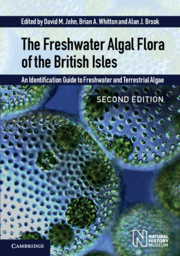 The Freshwater Algal Flora of the British Isles
The Freshwater Algal Flora of the British Isles Book contents
- Frontmatter
- Contents
- The online material (formerly provided in DVD format)
- List of Contributors
- Foreword
- Preface
- Acknowledgements
- Introduction
- Distribution and Ecology
- History of Freshwater Algal Studies in the British Isles
- Field Methods
- Laboratory Methods
- Water Framework Directive
- Cultures of British Freshwater Algae
- Classification
- Key to phyla
- Cyanobacteria (Cyanophyta)
- Phylum Rhodophyta (Red Algae)
- Phylum Euglenophyta (Euglenoids)
- Phylum Cryptophyta (Cryptomonads)
- Phylum Dinophyta (Dinoflagellates)
- Phylum Raphidophyta
- Phylum Haptophyta (Prymnesiophyta)
- Phylum Chrysophyta (Golden Algae)
- Phylum Xanthophyta (Tribophyta) (Yellow-Green Algae)
- Phylum Eustigmatophyta
- Phylum Bacillariophyta (Diatoms)
- Phylum Phaeophyta (Brown Algae)
- Primitive Green Algae (‘PRASINOPHYTA’)
- Phylum Chlorophyta (Green Algae)
- Phylum Glaucophyta
- Glossary
- Standard Form of Authors of Algal Names
- Sources of Illustrations or Material
- References
- Taxonomic Index
- Subject Index
- Plate Saction
- Miscellaneous Endmatter
- Miscellaneous Endmatter
Preface
Published online by Cambridge University Press: 12 January 2024
- Frontmatter
- Contents
- The online material (formerly provided in DVD format)
- List of Contributors
- Foreword
- Preface
- Acknowledgements
- Introduction
- Distribution and Ecology
- History of Freshwater Algal Studies in the British Isles
- Field Methods
- Laboratory Methods
- Water Framework Directive
- Cultures of British Freshwater Algae
- Classification
- Key to phyla
- Cyanobacteria (Cyanophyta)
- Phylum Rhodophyta (Red Algae)
- Phylum Euglenophyta (Euglenoids)
- Phylum Cryptophyta (Cryptomonads)
- Phylum Dinophyta (Dinoflagellates)
- Phylum Raphidophyta
- Phylum Haptophyta (Prymnesiophyta)
- Phylum Chrysophyta (Golden Algae)
- Phylum Xanthophyta (Tribophyta) (Yellow-Green Algae)
- Phylum Eustigmatophyta
- Phylum Bacillariophyta (Diatoms)
- Phylum Phaeophyta (Brown Algae)
- Primitive Green Algae (‘PRASINOPHYTA’)
- Phylum Chlorophyta (Green Algae)
- Phylum Glaucophyta
- Glossary
- Standard Form of Authors of Algal Names
- Sources of Illustrations or Material
- References
- Taxonomic Index
- Subject Index
- Plate Saction
- Miscellaneous Endmatter
- Miscellaneous Endmatter
Summary
First edition
An increasing awareness of the importance of freshwater algae in environmental management and monitoring has led to an increased demand for their accurate naming. However, when two of us started to run an annual training course at the University of Durham for biologists in the water industry and water management, a number of problems about which we were already partially aware became very obvious. In order to make reliable identifications of all the species present in a range of mixed samples, well over 40 publications were needed including identification guides, Floras, monographs and research papers. Many of these are written in languages other than English and, even for the better linguists, are not always easy to use, since they are mostly written for professional taxonomists. Almost all focus on regions other than the British Isles, many are expensive and some are frequently difficult to obtain. The only comprehensive guide for the British Isles remains West and Fritsch’s A Treatise on the British Freshwater Algae, first published in 1927.
It was evident that non-specialists require a userfriendly, well-illustrated identification guide written in English that should describe as many of the British freshwater algae as possible. Unfortunately, knowledge of the British freshwater algal flora remains far from complete. Many species recorded in the nineteenth century or early years of the twentieth century have not been recorded again. In a few cases this may be because of environmental changes, but more often than not it is simply because no one has resampled the localities and regions where these species grow. As a result of having no guide, we approached specialists in algal taxonomy and ecology with a proposal to produce a new and modern Flora dealing with all British freshwater algae. Everyone approached was very encouraging and offered strong support, despite a recognition that it was inevitable that the Flora would have many shortcomings.
In June 1991, the council of The British Phycological Society agreed to support the proposal submitted by two of us (DMJ, BAW) to prepare a modern synoptic account and identification guide to the freshwater and terrestrial algae of the British Isles. A committee was given the task of planning and organizing the ‘Flora Project’ and its first meeting took place at Durham on 25 September 1991. The Natural History Museum in London agreed to play a leading role by making staff time, workspace and other resources available.
- Type
- Chapter
- Information
- The Freshwater Algal Flora of the British IslesAn Identification Guide to Freshwater and Terrestrial Algae, pp. xiii - xivPublisher: Cambridge University PressPrint publication year: 2021


